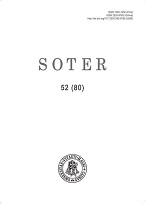„Netiesinio“ Jėzaus Kristaus teologijos bruožai kunigo Česlovo Kavaliausko raštuose
Jesus Christ’s “non-linear” theology traits in the works of priest Česlovas Kavaliauskas
Author(s): Jurgita FedorinienėSubject(s): Christian Theology and Religion
Published by: Vytauto Didžiojo Universitetas
Keywords: „Ntiesinė“ teologija; „Netiesinio“ Jėzaus Kristaus teologijos bruožai; Kunigas Česlovas Kavaliauskas “Non-linear” theology; The traits of “Non-linear” theology of Jesus Christ; Priest Česlovas Kavaliauskas
Summary/Abstract: Kunigas Č. Kavaliauskas ne tik gyveno gyvu aistringu asmeniniu tikėjimu, bet ir sukūrė savitą lietuviškąją „netiesinę“ teologiją, kuri nėra išsamiai tyrinėta. Č. Kavaliauskas siekė atskleisti tikrąjį Jėzaus paveikslą, pasitelkęs gamtos mokslus ir interpretuodamas Dievo visagalybę, geriausiai atsiskleidžiančią per kenotinio Jėzaus Kristaus asmenį. Č. Kavaliauskas, sekdamas krikščioniška apofatine tradicija ir egzistencinės filosofijos įžvalgomis, siekė parodyti, kaip Jėzus Kristus yra anapus-sąvokinis, neapibrėžiamas, nelinijinis, nebuhalterinis. Netiesinės fizikos ir matematikos pasiekimai padėjo suvokti tikrovės sritis, kurios žmogui atrodė nepasiekiamos, leido Jėzų Kristų – Dievo Sūnų – atskleisti kaip Išganytoją, nenuspėjamą, neaprėpiamą, teisingą, be jokių formulių, tikrą Dievą ir tikrą Žmogų. Č. Kavaliausko „netiesinė“ teologija priklauso originaliausioms XX a. paieškoms teologijos sityje. Priest Č. Kavaliauskas, who lived with passionate personal faith, created peculiar “non-linear” theology. Č. Kavaliauskas pursued to reveal the authentic picture of Jesus while relating natural sciences to the omnipotence of God. He attempted to prove that God is not conceptual, indefinite, non-linear and non-accounting. It has not been researched yet how Č. Kavaliauskas authentically reveals the personality of Jesus Christ and formulates the warps of “non-linear Christology” applying the insights of mathematics and physics in theology. The aim of the work is to reveal “non-linear” theology as a project which enriches theology with methods of natural sciences bringing out “non-linear” theology of Jesus Christ. Exclusive features of Č. Kavaliauskas’ theology, as well as his unique personality and ministry, are revealed in the work. Theoretical explanation of the rise of “non-linear” theology is brought out as well, as the features of “non-linear” theology, its significance and importance. The type of the research and theoretical research method used is theological concept (theologoumenon) as theological insight of the theologian. Č. Kavaliauskas’ manuscripts are analysed looking for the traits of “non-linear” theology and generalizations. According to Č. Kavaliauskas, “non-linear” theology is a project, seeking to enrich Catholic theology with methods of natural sciences. Č. Kavaliauskas called theology “non-linear” because there was a turning point in modern physics, and at the same time mathematicians with the help of physicists mastered the most complicated non-linear phenomena of the reality.
Journal: SOTER: religijos mokslo žurnalas
- Issue Year: 80/2014
- Issue No: 52
- Page Range: 7-20
- Page Count: 13
- Language: Lithuanian

